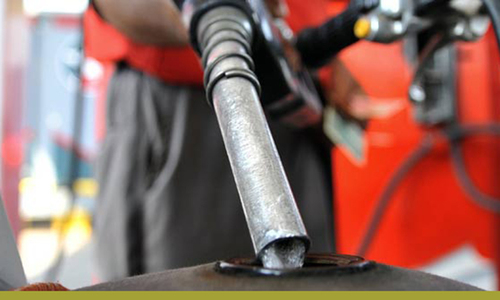ISLAMABAD: The government on Friday kept the prices of all petroleum products unchanged for the next 15 days by reducing tax rates.
“In line with the vision of the prime minister to provide relief to the consumers in the holy month of Ramazan, the government has decided not to increase the prices of petroleum products,” said an announcement by the Finance Division.
It said the government had to make “adjustment in the rates of petroleum levy on all petroleum products and a reduction in sales tax as well in case of kerosene oil and light diesel oil (LDO)”. The cumulative revenue impact of the decision would be Rs4.8 billion, it added.
In its announcement, the Finance Division made a misstatement that “it is pertinent to mention that the government was not charging any petroleum levy on kerosene and light diesel oil”. Interestingly, a notification seen by Dawn suggests that the government had been charging Rs3.51 per litre petroleum levy on kerosene and Rs3.27 on light diesel oil for the last 15 days.
The ex-depot prices of petrol and high speed diesel (HSD) would remain unchanged at Rs108.56 and Rs110.76 per litre, respectively. Likewise, the prices of kerosene and LDO would also stay unchanged at Rs80 and Rs77.65 per litre, respectively.
Based on the existing tax rates, the Oil and Gas Regulatory Authority had recommended an increase in the prices of all petroleum products.
The government had already collected almost 30 per cent higher than the targeted revenue on oil products through petroleum levy in the first six months of the current fiscal year. Therefore, it was comfortable with minor adjustments in petroleum levy. According to the finance ministry, the collection on account of petroleum levy amounted to Rs275bn in the first six months against the annual target of Rs450bn.
Over the last two years, the government has been tweaking with petroleum levy rates instead of GST as the levy remains in the federal kitty while GST goes to the divisible pool of taxes and thus about 57pc share is grabbed by the provinces.
Petrol and HSD are two major products that generate most of the revenue for the government because of their massive and yet growing consumption in the country. Average petrol sales are touching 700,000 tonnes per month against HSD’s monthly consumption of around 600,000 tonnes. Sales of kerosene and LDO are generally less than 11,000 and 2,000 tonnes per month, respectively.
Under a new mechanism, oil prices are revised by the government on a fortnightly basis to pass on international prices published in Platt’s Oilgram instead of the previous mechanism of monthly calculations on the basis of import cost of Pakistan State Oil.
Published in Dawn, May 1st, 2021














































